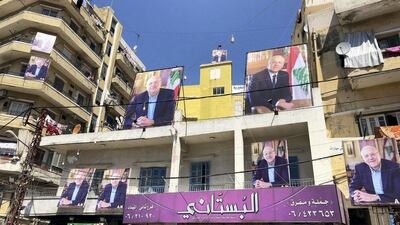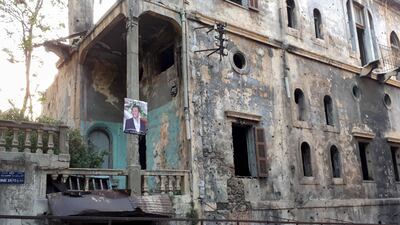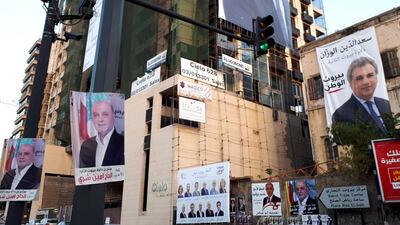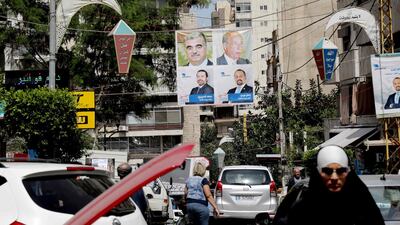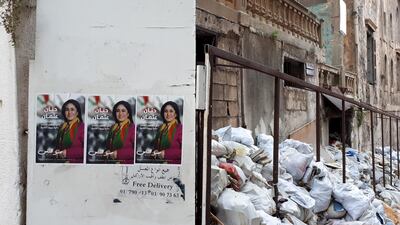There is a new electoral law in Lebanon and nearly 1,000 candidates have registered for the country's first parliamentary elections in a decade. But when the Lebanese go to the polls on Sunday, they'll be choosing from many of the usual faces.
Most experts agree that it’s already possible to accurately predict the outcomes of about two-thirds of the 128 seats.
Despite the changes in to the electoral system itself, seats in parliament, as well as executive positions, remain apportioned by sect.
While in the past parties have struck broad national coalitions due to a winner-take-all system, this election has seen more localized alliances within Lebanon’s 15 districts.
Counter-intuitively, parties may have candidates allied with one another in one district while running candidates against one another in a different district.
__________
Election coverage:
Lebanese elections 2018: live updates
Candidacy, conflict and territorial claims: Lebanon’s election posters
In Lebanon's election, one man's place in parliament is certain
Hezbollah will be paying close attention to Lebanon’s elections
__________
Here's what you need to know about the Lebanese elections, the country’s strongest political parties and their prospects:
When: Sunday, May 6, 2018
Expat turnout: 59 per cent
Registered voters in Lebanon: 3,665,514
Registered candidates: 976, including 111 women, a record number
Number of seats up for grabs: 128
Number of young people who have become eligible to vote since 2009 election: 700,000
The major parties running in the election:
Hezbollah
Lebanon’s most powerful political movement, Hezbollah has continued its long-standing electoral coordination with the Amal Movement as the “Hope and Loyalty” list.
Hezbollah’s status as the only Lebanese party with an active militia, as well as its military intervention on behalf of the Syrian government and wider involvement in region conflicts are contentious issues within Lebanon’s political sphere.
Hezbollah’s leaders have recently promised to return its focus to domestic issues, which have traditionally been a strong point for the party, which built much of its support by providing services to under-served Shiite communities across the country.
Read more: Candidacy, conflict and territorial claims: Lebanon’s election posters
“Hezbollah and their allies will address serious shortcomings and make up for mistakes made in the past, God willing,” leader Hassan Nasrallah said during a rally earlier this week in eastern Lebanon.
Mr Nasrallah has also offered pointed jabs at the Future Movement while defending the group’s involvement in Syria fighting Sunni extremist groups.
“The Future Movement is responsible for your deprivation and neglect. Would you elect those who were at your service as much as possible and were busy fighting regional threats or would you choose those who turned their back for you?” Mr Nasrallah asked during the rally.
Future Movement
Led by current prime minister Saad Hariri, Future is the most popular party among Lebanese Sunnis. Rhetoric between Future and Hezbollah has been tense, particularly around the city of Baalbek in the Beqaa Valley, where both sides are hoping to gain seats.
Mr Hariri is the son of former prime minister Rafik Hariri, who was assassinated in 2005. Since that time, Hezbollah and Future’s rivalry has been the most significant fissure in Lebanese politics.
Mr Hariri has accused Hezbollah, which receives financial and military aid from Iran, as seeking to alter Lebanon’s “Arab identity” and violate the country’s commitment to avoid involvement in regional conflicts.
__________
More on the election from The National's foreign editor Arthur MacMillan in Beirut:
In Lebanon, women vote but few are chosen
Lebanon paves way to election as regional tension soars
A bloody history that encapsulates Lebanon's woes
__________
In the last year, Mr Hariri and Hezbollah have at least temporarily ended their rivalry to form a government of consensus after nearly two years without one. While Mr Hariri remains likely to retain his position as prime minister, negotiations to form a government after the elections could still be contentious.
Mr Hariri has also cast the vote as a contest between Hezbollah and the Future Movement.
“The elections will determine the identity of Beirut and all of Lebanon,” Mr Hariri said earlier this week, while campaigning in Beirut. “There are eight lists against us in Beirut and all of them serve Hezbollah.”
Mr Hariri’s father was a construction magnate who helped rebuild Beirut after the country’s civil war, a legacy Mr Hariri has drawn upon.
“It is time for Beirut to trust he who is trying to revive the country," he said. "The international community has confidence in us as a government, as Saad Hariri, as Future movement and in our way of work, our programs and moderation.”
Amal Movement
Amal was the most popular Shiite political party in the 1980s, prior to the ascension of Hezbollah. The party is led by current speaker of parliament Nabih Berri, who is widely expected to retain his parliamentary seat and be elected to the position for a sixth time.
Free Patriotic Movement
Lebanon’s largest Christian party is led by Gebran Bassil, the current foreign minister and son-in-law of current president Michel Aoun. Mr Bassil and Mr Berri are deeply antagonistic toward one another, and Mr Hariri found himself mediating disputes between FPM and Amal over the course of the last year.
Though Mr Aoun and Mr Hariri were once political rivals, FPM has allied with the Future Movement in many districts.
Progressive Socialist Party
Longtime Druze leader Walid Jumblatt has handed over the political reins to his son Taymour Jumblatt, who will be standing in his father’s place for elections.
Kataeb Party
Predominantly Christian party led by Sami Gemayel, the son of former president Amine Gemayel.
Lebanese Forces
Christian party led by formerly imprisoned militia leader Samir Gagea.
Kollouna Watani
Kollouna Watani (“All for the Nation”) is the newest major political grouping in the country and the only one not affiliated with one of Lebanon’s sects. The list of 66 candidates have “civil society” backgrounds and are contesting races all over the country, particularly in Beirut, where civil society candidates received nearly half the vote in municipal elections in 2016.
Major issues:
All the parties will be battling voter apathy – Lebanon’s youth in particular are pessimistic about the future of the country, both politically and economically.
Corruption, unemployment and wages and the state of Lebanon’s infrastructure are major issues, as is balancing the country’s budget. The IMF warned this week that Lebanon’s economy is “unsustainable” at its current rate of debt to gross domestic product.
Other issues include:
- The country's ongoing trash collection and disposal crisis
- A lack of 24-hour electricity
- The handling of the country's Syrian refugee crisis
